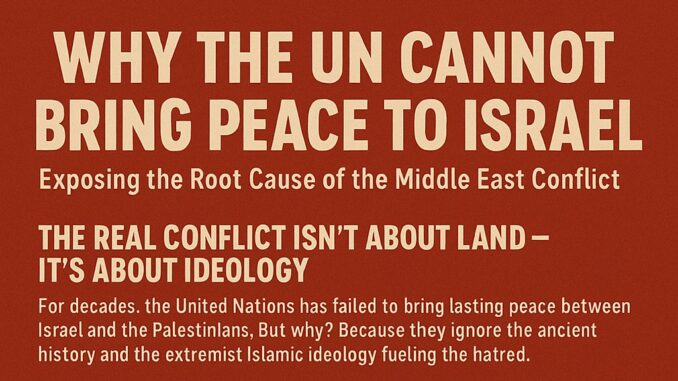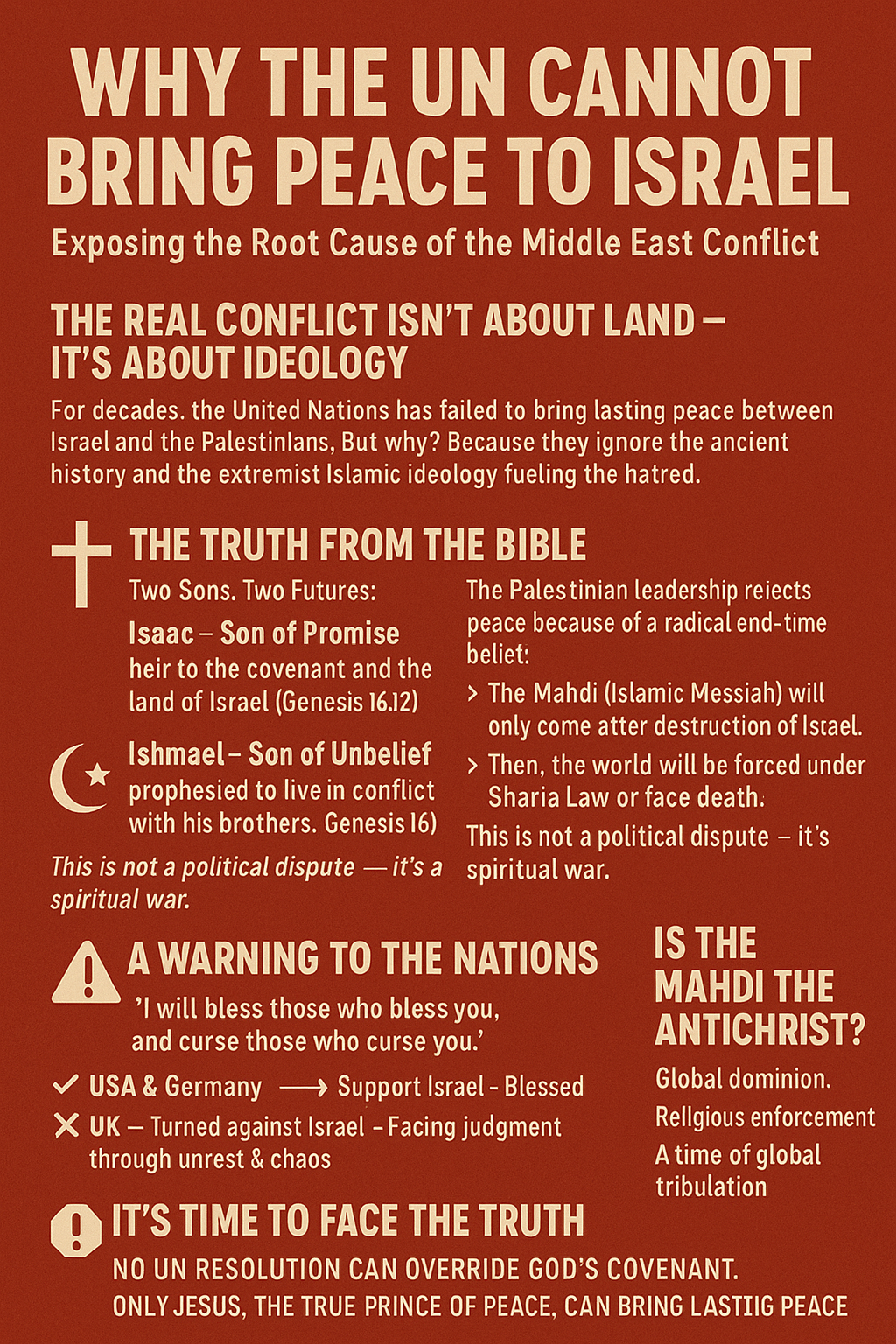

Ignoring Extremist Islamic Ideology and Ancient History
The Israeli-Palestinian conflict has been a longstanding challenge for the international community, with the United Nations playing a significant role in attempting to resolve the issue. However, despite numerous efforts, the UN has failed to bring about a lasting peace. One major reason for this failure is the refusal to acknowledge and address the extremist Islamic ideology that underlies much of the conflict.
The Historical Context
The conflict between Israel and the Palestinians is not a modern phenomenon, but rather a centuries-old spiritual conflict that began with Abraham, Isaac, and Ishmael. According to the Bible, God promised Abraham that his son Isaac would be the heir of God’s covenant promises, including the land of Israel (Genesis 17:15–22; 21:1–21). However, Abraham also had a son named Ishmael, born to his servant Hagar, as a result of Abraham’s unbelief in God’s promise (Genesis 16:1–16).
What many do not realise is that Gaza, the West Bank, and surrounding territories were part of the ancient kingdom of Israel more than 3,000 years ago, during the reigns of King David (c. 1000 BC) and King Solomon. These areas were included in the territories assigned to the tribes of Israel.
After crushing the Jewish Bar Kokhba Revolt in 135 AD, the Roman Empire renamed the land “Palestina” as an intentional insult to the Jews — invoking the name of their historic enemies, the Philistines. This was a political move to erase Jewish identity and sever their connection to the land. But history has shown that this attempt to eliminate Israel from memory failed — the Jewish people and their claim to the land endure to this day.
God’s Promise to Abraham: Isaac and the Blessing of All Nations
The Promise That Changed the World
Long before the birth of Israel as a nation, before the Law was given or kings ruled, God made a covenant with a man named Abram — later called Abraham. This covenant wasn’t just for Abraham’s benefit — it was a world-changing promise that would affect every nation on earth.
“In your seed all the nations of the earth shall be blessed, because you have obeyed My voice.”
— Genesis 22:18 (NASB)
Abraham and the Impossible Promise
God first spoke to Abram when he was 75 years old, promising to make him a great nation, even though he and his wife Sarai (later Sarah) were childless.
👉 Genesis 12:1–3
Years passed, and the promise seemed delayed. Sarai was barren and growing old. So they took matters into their own hands: Sarai urged Abraham to father a child through her servant Hagar, and Ishmael was born.
👉 Genesis 16:1–4
But Ishmael was not the child of promise. God had another plan.
Isaac: The Supernatural Son
When Abraham was 99 and Sarah 89, God reappeared to reaffirm His covenant and clarify that the promised child would come through Sarah, not Hagar.
“…Sarah your wife will bear you a son, and you shall name him Isaac; and I will establish My covenant with him as an everlasting covenant for his descendants after him.”
— Genesis 17:19
Sarah laughed at the idea, given her age — and so the child was named Isaac, which means “laughter.”
👉 Genesis 18:10–14
A year later, Sarah gave birth to Isaac — a miracle child, born not by human effort, but by God’s promise.
👉 Genesis 21:1–3
The Blessing to All Nations
God’s covenant wasn’t just about a physical nation. It was through Isaac’s descendants that the ultimate Seed would come — the Messiah, Jesus Christ.
“It is through Isaac that your descendants shall be named.”
— Romans 9:7“Now the promises were spoken to Abraham and to his seed… and to your Seed, that is, Christ.”
— Galatians 3:16
Through Jesus, a descendant of Isaac, the Gospel would go out to every nation, offering salvation by faith — not by birth or law — to all who believe.
A Covenant of Faith, Not Works
Abraham believed God’s promise — and that faith was counted to him as righteousness.
👉 Genesis 15:6
👉 Romans 4:20–22
That same promise is extended today:
“If you belong to Christ, then you are Abraham’s descendants, heirs according to promise.”
— Galatians 3:29
This means that through faith in Jesus, people of every tribe and tongue can receive the eternal blessing promised to Abraham.
Isaac Was a Foreshadow of Christ
In Genesis 22, Abraham is asked to sacrifice Isaac — the son he loved — on Mount Moriah. At the last moment, God provides a ram as a substitute. This wasn’t just a test of obedience — it was a prophetic picture of the cross.
Just as Isaac carried the wood up the mountain, Jesus carried His cross. But where Isaac was spared, Jesus was not. He gave His life as the Lamb of God for the sins of the world.
👉 John 1:29
👉 Romans 8:32
Conclusion: Are You Part of the Promise?
Isaac’s birth was the beginning of something eternal — a plan God had set in motion to bless you through faith in Jesus Christ, the true Seed of Abraham.
Have you received that blessing?
You don’t become part of God’s covenant by joining a religion or trying to keep rules. You become part of the promise by believing the gospel — the good news that Jesus died for your sins and rose again.
👉 1 Corinthians 15:1–4
The Prophecy of Ishmael – The Son of Unbelief
Ishmael was the result of Abraham’s human attempt to fulfil God’s promise by his own strength. As such, Ishmael represents unbelief and human effort in contrast to the son of promise, Isaac. God prophesied that Ishmael would be like a wild donkey, constantly in conflict with others (Genesis 16:12). This prophecy has played out historically, as the descendants of Ishmael — the Arabs — have often been in hostility with the descendants of Isaac — the Jews.
The Prophecy of Isaac – The Son of Promise
Isaac, the son born by faith, was the child of the covenant. God declared that through Isaac, Abraham’s seed would be called and the land of Canaan would be given to his descendants (Genesis 17:8). This promise is reaffirmed throughout Scripture and history, as the Jews — Isaac’s descendants — continue to receive God’s protection, preservation, and prophetic fulfilment.
The Role of Islamic Ideology
The Palestinian Authority’s refusal to recognize Israel’s right to exist and its continued glorification of terrorism are not merely political. They are driven by extremist Islamic ideology rooted in Islamic eschatology — the belief that the Mahdi, Islam’s prophesied messianic figure, will not come until the Jews are destroyed.
This ideology asserts that the Mahdi will usher in a global Islamic caliphate under Sharia Law, and all non-Muslims must convert or die. This isn’t a call for coexistence; it’s a theological mandate for domination. As long as this belief fuels the hearts of those in power amongst Palestinians and their allies, there can be no peace — only conflict.
The UN’s Failure to Address the Issue
Despite its numerous resolutions and peacekeeping efforts, the United Nations has failed to recognize the true spiritual nature of this conflict. By ignoring both biblical history and Islamic ideology, the UN deals only with the surface-level political issues and completely misses the root cause.
This isn’t about borders — it’s about belief systems.
This isn’t about real estate — it’s about prophecy, promise, and purpose.
Until the spiritual foundation of this conflict is acknowledged, the UN will continue to pursue empty peace plans that are destined to fail.
A Warning to Nations: Bless or Curse Israel
“I will bless those who bless you, and curse those who curse you.”
— Genesis 12:3
This divine principle still operates today. Nations that bless and support Israel are blessed. Those who oppose, divide, or curse Israel invite judgment upon themselves.
Modern Examples
- United States: Historically a strong ally of Israel, experiencing great prosperity and global influence.
- Germany: Has shown increasing support for Israel in recent decades, seeing economic growth and stability.
- United Kingdom: Once a faithful supporter of Israel, but now promotes a two-state solution and aligns against biblical prophecy.
As a result, the UK faces growing illegal Islamic immigration, cultural unrest, and political instability — a clear warning sign of God’s judgment.
The Mahdi and the Antichrist: A Possible Connection?
Many Bible scholars have noted striking similarities between Islam’s Mahdi and the Bible’s Antichrist:
- Both emerge in the end times
- Both bring global upheaval
- Both demand total allegiance
- Both promise peace but bring destruction
Is it possible they are the same figure seen through different lenses? Either way, the parallels should raise alarm.
Conclusion
The land of Israel is not up for negotiation — it belongs to the descendants of Isaac, not Ishmael, and it is God who gave it. The world may try to divide or rename the land, but God’s Word stands forever.
The United Nations has failed because it refuses to recognise spiritual truth. Only through faith in Jesus Christ, the true Prince of Peace, will true reconciliation come — first between God and man, and then between nations.
“Pray for the peace of Jerusalem: they shall prosper that love thee.” — Psalm 122:6
Until then, the Church must stand firm:
✅ Bless Israel
✅ Proclaim the Gospel
✅ Expose deception
✅ Pray for the peace of Jerusalem
👉 Psalm 122:6
📣 Published by:
Reach NZ Evangelism Network
🌐 www.reachnz.org
